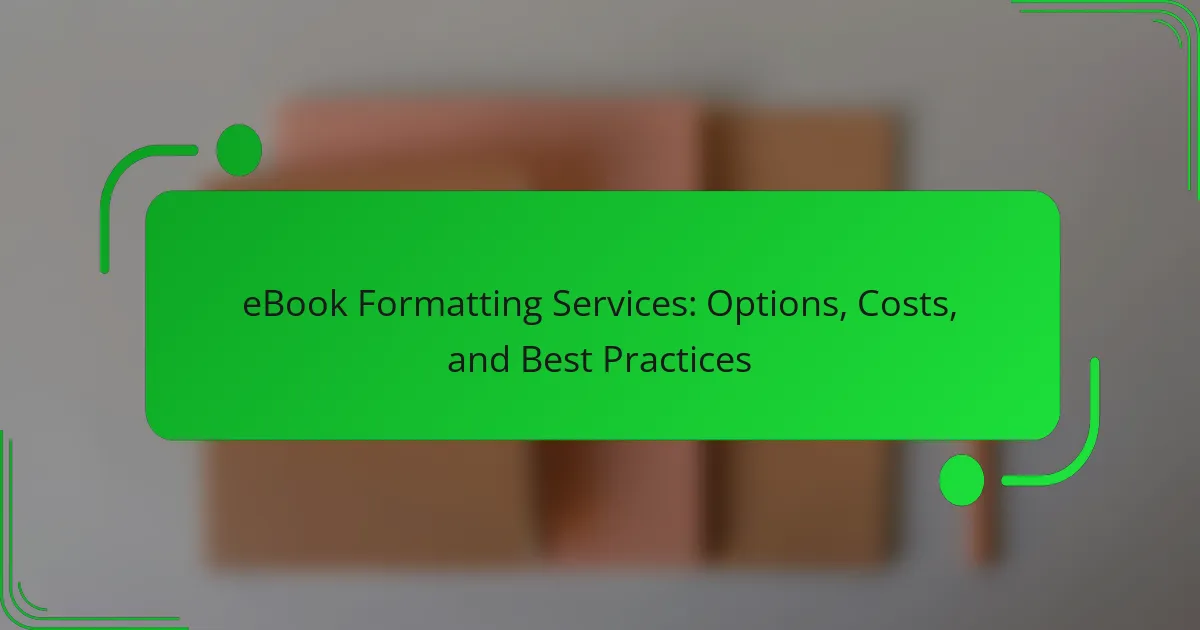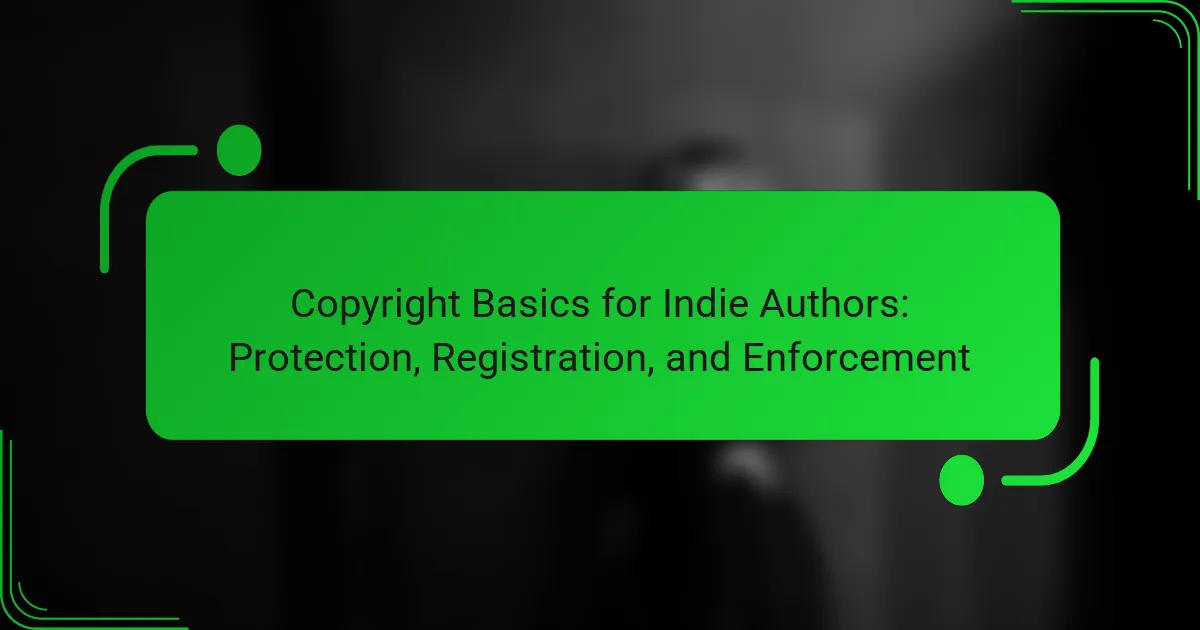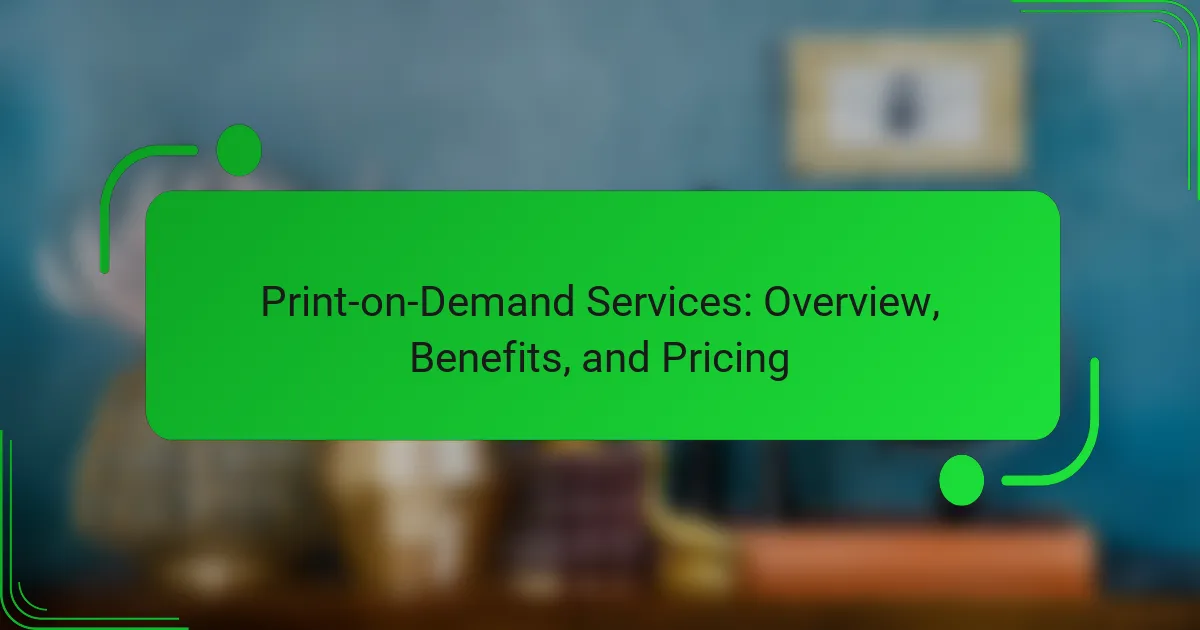Free online libraries provide unrestricted access to a wealth of resources, enhancing learning opportunities for users. They offer diverse content, including eBooks, audiobooks, and academic journals, with varying access methods and formats. Popular titles range from classic literature to contemporary novels, reflecting the richness of digital literature. Users may face challenges like limited search functionality and inconsistent resource availability, but strategies exist to maximize their experience.
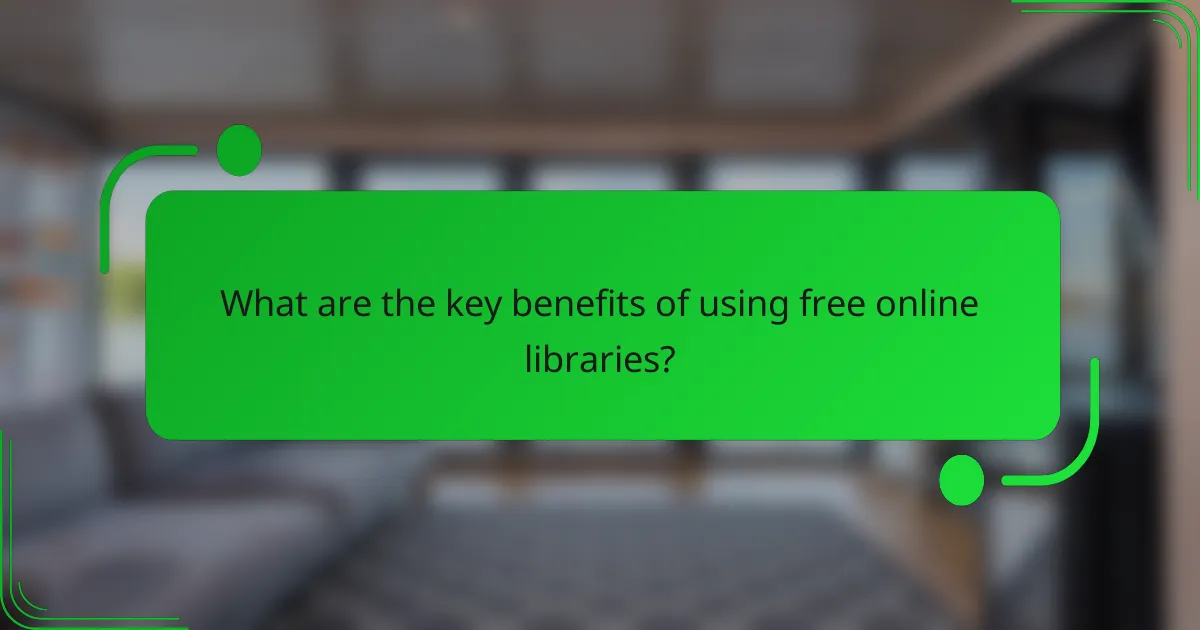
What are the key benefits of using free online libraries?
Free online libraries offer numerous benefits, including unrestricted access to a vast array of resources. They provide users with free e-books, academic journals, and multimedia content, enhancing learning opportunities. Additionally, these libraries promote literacy and lifelong learning, making knowledge accessible to diverse audiences. Their convenience allows users to access materials anytime, fostering a culture of self-directed education.
How do free online libraries enhance access to literature?
Free online libraries significantly enhance access to literature by providing free resources to diverse audiences. They democratize information, allowing users to explore a vast array of genres and titles without financial barriers. These platforms often feature unique collections, including rare books and academic texts, which may not be available in traditional libraries. Additionally, they support various formats, such as eBooks and audiobooks, catering to different reading preferences. As a result, free online libraries foster a culture of learning and literacy globally, empowering individuals to engage with literature more easily.
In what ways do free online libraries support education and research?
Free online libraries support education and research by providing accessible resources, diverse materials, and collaborative platforms. They offer a wide range of eBooks, journals, and multimedia content that enhance learning opportunities. Additionally, these libraries often include tools for citation and research assistance, promoting effective study practices. Their unique attribute is the ability to reach users globally, breaking down geographical barriers to knowledge.
What are the environmental benefits of digital libraries compared to physical ones?
Digital libraries offer significant environmental benefits compared to physical libraries. They reduce paper usage, lowering deforestation rates. Digital access minimizes the carbon footprint associated with transporting books. Additionally, they eliminate the need for physical space, conserving resources used in building and maintaining library facilities. These factors contribute to a more sustainable approach to information access.
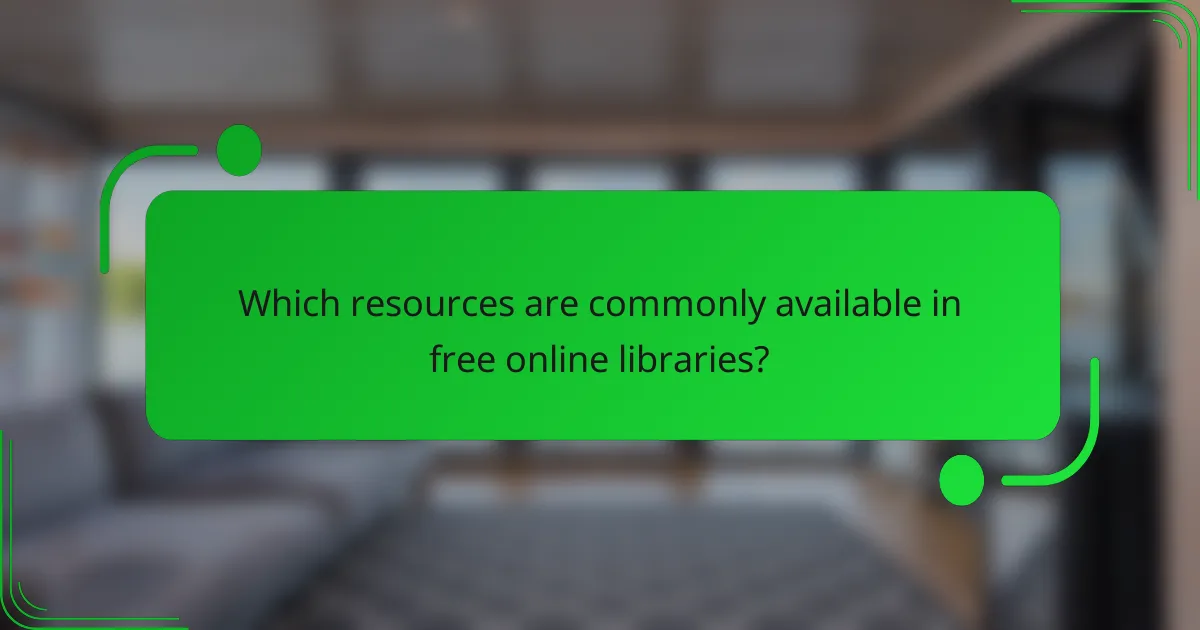
Which resources are commonly available in free online libraries?
Free online libraries commonly offer eBooks, audiobooks, academic journals, magazines, reference materials, and educational resources. These platforms provide diverse content accessible to anyone with an internet connection. Popular titles often include classic literature, contemporary novels, and research papers. The availability of resources varies by library, but many prioritize user-friendly access and comprehensive collections.
What types of content can users expect to find?
Users can expect to find a variety of content in free online libraries, including eBooks, audiobooks, research articles, and educational resources. These libraries provide access to classic literature, contemporary bestsellers, and academic materials across multiple subjects. Popular titles often include works by renowned authors and essential texts for various fields of study. Additionally, users may discover unique collections or rare publications that are not widely available elsewhere.
How do multimedia resources enhance the user experience?
Multimedia resources significantly enhance user experience by providing diverse formats that engage different learning styles. They facilitate deeper understanding and retention of information through interactive elements like videos, audio, and visuals. This variety caters to users’ preferences, making learning more enjoyable and effective. Additionally, free online libraries often include popular titles in multimedia formats, increasing accessibility and appealing to a broader audience.
Which platforms offer the most diverse collections?
Platforms offering diverse collections of free online libraries include Project Gutenberg, Internet Archive, Open Library, and Google Books. These platforms provide extensive access to various genres and formats, catering to different reading preferences. Project Gutenberg features over 60,000 free eBooks, while the Internet Archive offers millions of texts, audio, and video materials. Open Library allows users to borrow eBooks, and Google Books provides access to a vast collection of scanned books.
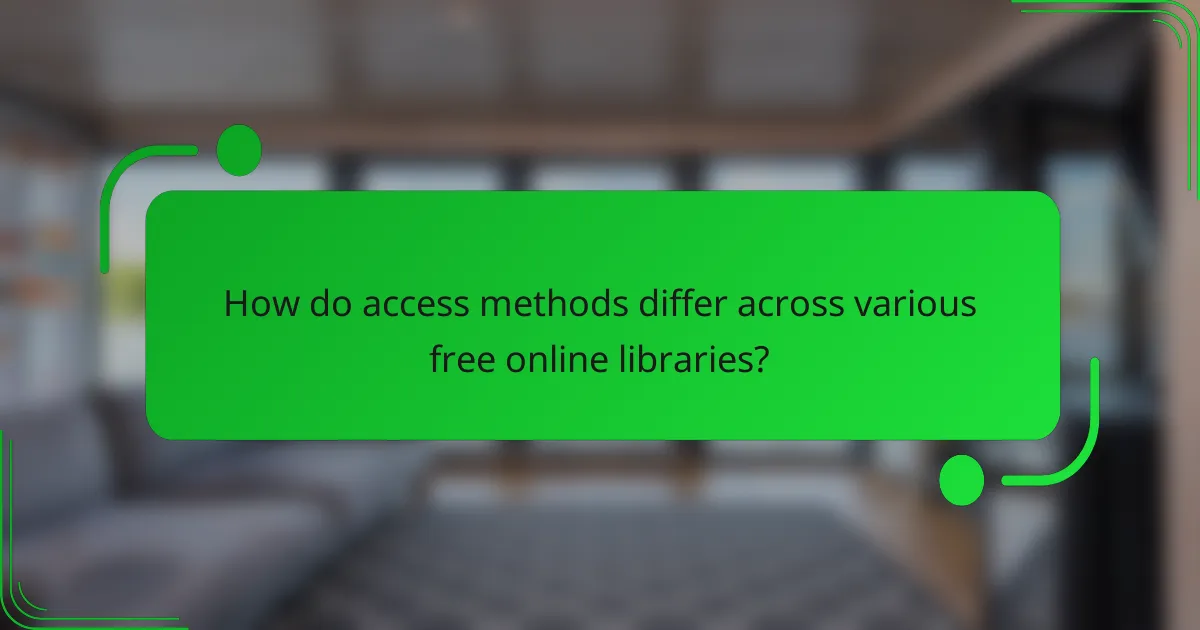
How do access methods differ across various free online libraries?
Access methods across free online libraries vary significantly. Some libraries require user registration, while others offer open access without any barriers.
Many platforms provide downloadable resources in various formats, such as PDFs or ePub. Others may allow streaming or online reading only. Additionally, some libraries feature advanced search tools, enhancing user experience, while others have basic search functionalities.
For instance, Project Gutenberg offers over 60,000 free eBooks with no registration needed, while the Internet Archive requires users to create an account for borrowing digital items.
These differences impact how users engage with resources, influencing accessibility and convenience.
What are the common user authentication processes?
Common user authentication processes include username and password, multi-factor authentication, biometric verification, and social media login. Each method enhances security by verifying user identity in distinct ways. Username and password are the traditional approach, while multi-factor authentication adds an extra layer of security through additional verification methods. Biometric verification uses unique physical traits, such as fingerprints or facial recognition. Social media login allows users to authenticate through existing accounts, streamlining access.
How do regional restrictions impact access to certain titles?
Regional restrictions limit access to certain titles in free online libraries. These restrictions often arise from copyright laws that vary by country. As a result, users in some regions may find popular titles unavailable, impacting their access to diverse resources. This limitation can hinder educational opportunities and reduce the variety of available content.
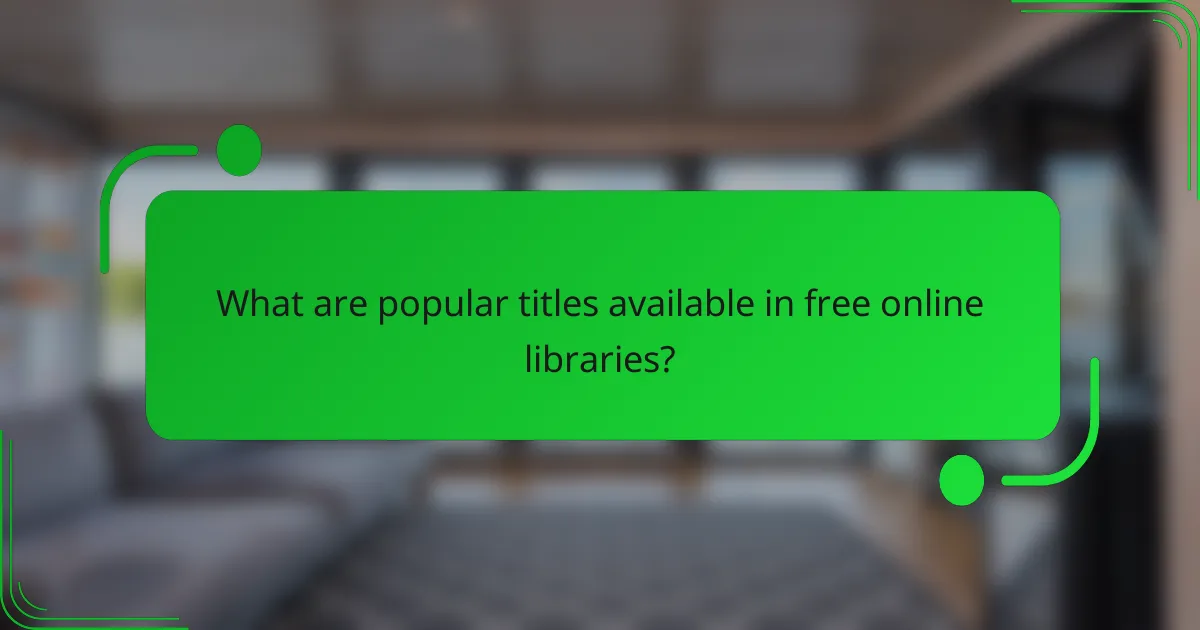
What are popular titles available in free online libraries?
Free online libraries offer a wide range of popular titles across various genres. Notable examples include classic literature, contemporary novels, and academic resources.
Some popular titles available in free online libraries are:
1. “Pride and Prejudice” by Jane Austen
2. “Moby Dick” by Herman Melville
3. “The Adventures of Sherlock Holmes” by Arthur Conan Doyle
4. “The Great Gatsby” by F. Scott Fitzgerald
5. “1984” by George Orwell
6. “To Kill a Mockingbird” by Harper Lee
These titles reflect the rich diversity and accessibility of literature in digital formats.
Which classic literature is frequently accessed by users?
Classic literature frequently accessed by users includes titles such as “Pride and Prejudice,” “Moby Dick,” and “1984.” These works are popular due to their enduring themes and accessibility in free online libraries. Other notable mentions are “Jane Eyre,” “The Great Gatsby,” and “War and Peace.” These titles attract readers seeking both educational resources and enjoyment, reflecting their significance in literary history.
What contemporary works have gained traction in digital collections?
Contemporary works gaining traction in digital collections include diverse genres and formats. Popular titles often feature innovative storytelling and accessibility. Notable examples are “The Vanishing Half” by Brit Bennett and “The Midnight Library” by Matt Haig, both of which explore complex themes. Digital collections enhance access to these works, attracting a wider audience.
How do user ratings influence the popularity of titles?
User ratings significantly enhance the popularity of titles in free online libraries. Higher ratings attract more users, leading to increased visibility and engagement. Positive feedback often correlates with quality content, which encourages others to explore those titles. Conversely, low ratings can deter potential readers, diminishing a title’s reach. Overall, user ratings serve as a crucial indicator of a title’s appeal and relevance in a vast digital resource landscape.
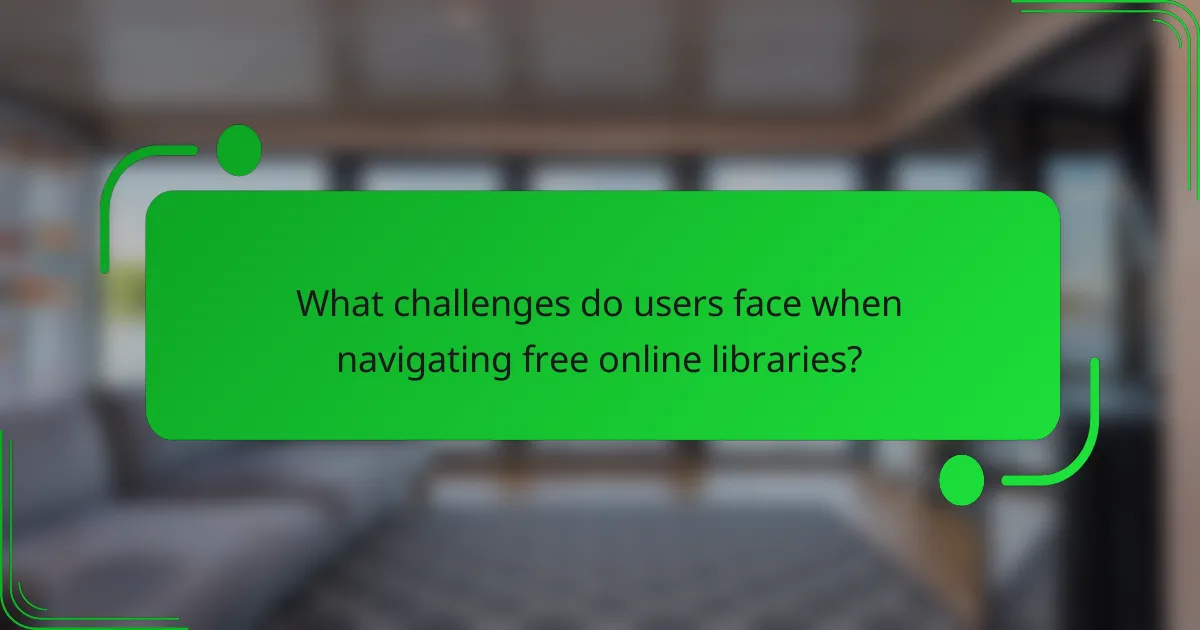
What challenges do users face when navigating free online libraries?
Users face several challenges when navigating free online libraries, including limited search functionality, inconsistent resource availability, and varying user interfaces.
Limited search functionality often hampers users from finding specific titles or topics efficiently. Many platforms lack advanced filtering options, making it difficult to refine searches based on criteria like publication date or genre.
Inconsistent resource availability can frustrate users, as some libraries may not have the same titles or editions. This inconsistency can lead to confusion about where to find desired materials.
Varying user interfaces across different online libraries can create a steep learning curve. Users may struggle to adapt to different navigation styles, which can hinder their overall experience.
How does the digital divide affect access to online resources?
The digital divide significantly limits access to online resources, including free online libraries. Individuals without reliable internet or devices face barriers to educational materials and information. This gap affects learning opportunities and perpetuates inequalities. As a result, communities with limited access miss out on valuable resources that could enhance knowledge and skills.
What common technical issues do users encounter?
Users often encounter issues like slow loading times, broken links, and difficulty in navigating free online libraries. These technical problems can hinder access to resources and popular titles. Additionally, users may face compatibility issues with certain devices or browsers, limiting their ability to utilize available materials effectively. As a result, these challenges can impact the overall user experience and accessibility of valuable content.
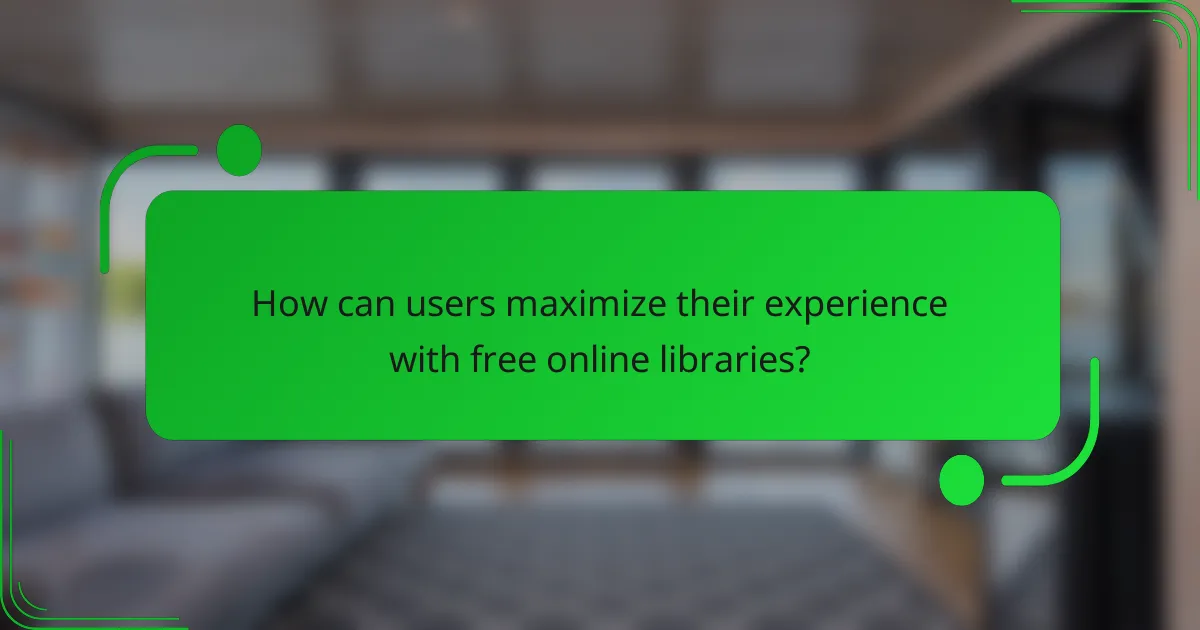
How can users maximize their experience with free online libraries?
Users can maximize their experience with free online libraries by exploring diverse resources, utilizing search features, and engaging with community forums.
Access a variety of formats, including eBooks, audiobooks, and academic journals. Familiarize yourself with the library’s interface to navigate effectively. Use advanced search options to find specific titles or subjects.
Participate in online discussions to gain insights and recommendations from other users. Many libraries offer reading lists and curated collections that highlight popular and trending titles.
Regularly check for new additions and updates to keep your reading list fresh. Utilize mobile applications if available, allowing access on-the-go.
What are the best practices for searching and finding resources?
To effectively search and find resources in free online libraries, utilize specific strategies. Start by identifying keywords related to your topic. Use advanced search options to filter results by date, format, or subject. Familiarize yourself with library databases like Project Gutenberg and Open Library, which offer extensive collections. Bookmark reliable sources for future reference. Explore user reviews and ratings to gauge resource quality.
Which tools can enhance the reading experience?
Free online libraries enhance the reading experience by providing diverse resources and accessibility. Tools like Libby, Project Gutenberg, and Open Library offer vast collections of eBooks and audiobooks. These platforms feature user-friendly interfaces, allowing easy navigation and search options. Additionally, many libraries provide personalized recommendations based on reading preferences, enriching the user’s literary journey.
What are common mistakes to avoid when using digital libraries?
Common mistakes to avoid when using digital libraries include inadequate search strategies, overlooking advanced search options, neglecting citation practices, and failing to evaluate resource credibility. These errors can lead to inefficient research and misinformation.
Inadequate search strategies can result in missed resources. Users should utilize specific keywords and filters to enhance search results. Overlooking advanced search options limits the ability to refine searches effectively. Users must familiarize themselves with these tools for better outcomes.
Neglecting citation practices can lead to plagiarism. Properly citing sources is crucial in maintaining academic integrity. Failing to evaluate resource credibility can result in using unreliable information. Users should assess the author’s qualifications and the publication’s reputation to ensure quality.
